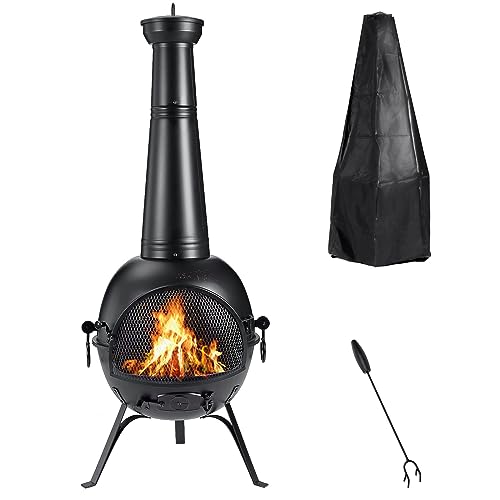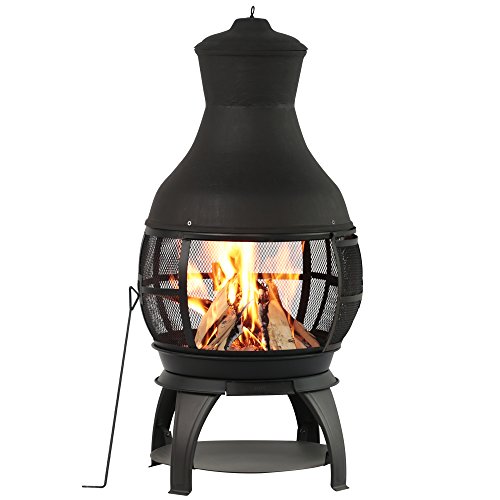20 Trailblazers Setting The Standard In Ceramic Chiminea
페이지 정보
작성자 Grace 작성일24-09-20 05:17 조회56회 댓글0건관련링크
본문
 The Basics of a Ceramic Chiminea
The Basics of a Ceramic ChimineaClay is the most commonly used material used to make chimineas. Think of terra cotta pots or those red pottery ones. Clay is tough and durable but it can also crack when handled improperly.
Clay is very absorbent, and therefore needs to be protected by sand and gravel at the bottom of a chiminea, along with some kindling or logs. This protects the clay from burning too hot and seals hairline cracks.
Materials
Traditional clay chimineas are sometimes called pot-bellied ovens, have a chimney that directs smoke into the air. These chimineas are coated with glazes to guard them against weathering and cracking caused by sudden temperature changes. However, they remain vulnerable to rain and sun. Therefore, it is important to cover them when not in use, and to stop water puddles from forming inside the clay.
The majority of chimineas are made out of terracotta clay, but other materials like cast iron and steel are available. Terracotta offers a classic Mexican-inspired look as well as aluminum and cast iron are strong alternatives that require less care than terracotta. Some manufacturers offer modern styles which combine the beauty and durability of a chiminea made of clay.
Many people prefer to match their chimineas with evergreens or flowering plants. This gives an organic appearance that compliments the ambience of their backyard space. It is important to carefully choose the plant combinations as a Chiminea must be placed in a place that is free from structures that could catch fire. It is crucial to ensure that the chiminea is placed on a fire-safe area such as a brick, concrete or stone patio.
A chiminea is usually constructed by hand using high-fired clay that may or may not be coated with glaze. The artisan who shapes the clay is known as a potter. they can either throw the piece on a wheel for a potter or using a mould made of plaster. In either case the clay is kneaded and smoothed before being dried. Some of the latest clay chimineas have been pre-grogged. This is a compound that helps them resist thermal stress which is prone to cracking earthenware.
Other chimineas can be made in metal molds, which give them different styles and shapes to suit any backyard. Cast iron chimineas are heavier than clay models, however, they are more robust and less likely to break or crack due to sudden temperature fluctuations. Cast iron chimineas are also more affordable than other types, and are available in gas-burning versions to give you more versatility.
Styles
Chimineas are fireplaces that can be decorated with a variety styles and materials. Terracotta chimineas provide the traditional look that has been around for centuries and metal alternatives are more durable and handle high temperatures. A lot of chimineas come with decorative patterns and designs to enhance the patio furniture. A rusty patina finish, for example, can give a chiminea an old-fashioned flair, especially when coupled with iron and wood patio furniture.
Chimineas can be freestanding or hung on a patio that is made of stone, brick or concrete. No matter where you decide to place your chiminea, be sure it is safe from wind and from any plant or structure that is flammable. It is important to remember that chimineas can emit soot and smoke that could affect the air quality in the area.
Some chimineas have an opening for the chimney at the bottom of the structure, while others are pointed upwards and squat. Both models come with or without an opening to allow for the addition of firewood. The chimneys on squat models are also able to be shaped in order to create an even more striking appearance and enhance the visual appeal.
You can also add decorative elements to the exterior of your chiminea, such as wrought iron, marble, or granite. To add a touch of flair, you might consider the option of a copper or ceramic top. These finishes reflect light and enhance the look of your chiminea.
Chiminea polishing on a regular basis is a great method to enhance the appearance of your Safavieh Cartagena Silver & Black Outdoor Chiminea (fireplacesandstove.com) fire pit and shield it from harm. Make use of olive oil, beeswax or other natural products to polish the surface for an ethereal shining finish. Apply a thin layer and rub gently, then rinse and dry the chiminea to achieve a sparkling result.
Chimineas need a lot of maintenance, but with the right care and attention, your imaginative outdoor chiminea can remain Stylish Terracotta Palo Santo Incense Holder for years to come. By using practical decorating strategies and maintaining your chiminea's condition, you'll be able to enjoy it throughout the cooler seasons.
Safety
Despite being popular, chimineas can be dangerous if they are not used in a safe manner. Clay chimineas, especially unglazed ones, are prone to breaking and cracking. They can also be a fire risk in proximity to flammable materials like your furniture outside, your home and in the garden. It is best to use your chiminea outdoors, and in a space that is surrounded by fire-proof material or secured.
You should always keep a fire extinguisher nearby and use it to put out small fires or hot coals that arise when you are attempting to tend the flame. It is also an excellent idea to employ a long lighter in order to light the fire and move coals around with tongs instead of using your hands. A bucket of water is also useful to have nearby in case the chiminea requires to be extinguished. However, it is important not to use water to extinguish the chiminea that has been chilled down and to only add water after the fire has died naturally or if a large fire is at risk of overflowing the chimney.
The draft generated by a chiminea can send sparks upwards through the stack, so it is crucial to safeguard your home and neighbors from burns that could happen accidentally by using an easy spark arrestor made of chicken wire placed around the top of the smokestack. Chimineas also generate lots of heat, and the area around them can become extremely hot, so you should put up a low wall around the chiminea to remind people that coming too close could result in painful burns.
Do not burn your chiminea in stormy or rainy weather. The sparks could cause the chimney to catch Cuisinart Propane Fire Pit Chimenea - Safety Switch, which could cause damage to your home. Before using a chiminea consult the local fire department to ensure there are no burning bans in place. Before you add firewood to the chiminea, it is recommended to clear the area surrounding it. This will ensure that there aren't any materials that could ignite in the area. It is also recommended to wash the interior of your chiminea after each use in order to avoid ash accumulation that could cause smoke inhalation and a sooty exterior.
Maintenance
Clay chimineas require a bit of maintenance even though they can be used to create outdoor fires. To ensure their longevity, they must be treated exactly the same way as all clay products. This means avoiding making them too hot too quickly, and making sure to allow them to cool down between each use. In addition they should be frequently cleaned and sealed to prevent the paint from being damaged by moisture.
The first step to keep your chiminea in good shape is to clean the ashes that have accumulated after every use, but only after the chiminea has completely cool down. Even though it appears to be cooling down however, the ash will be hot. Use small brushes and rakes to get rid of it. Once you've swept the ash off and disposed of it with care the next step is to fill the bottom with gravel or sand. This is crucial, as in the event that you fail to do this, the chiminea will crack. The clay absorbs moisture and may crack if it gets too dry.
Some sources recommend sealing the exterior of the chiminea with an acrylic waterproofing agent, similar to those used to seal tiles. This will stop moisture from causing damage to the chiminea. During periods of heavy use it is recommended to clean and seal the chiminea every 6-8 weeks.
Chimineas are only to be used on surfaces free of wood or other coverings. Using only well-seasoned hardwood will also lessen the number of sparks that are produced and help to avoid cracking the clay.
 A chiminea that is made of clay will not last for long. However, it is difficult to break unless you smash it with an extremely heavy hit. Cracks can develop for a variety of reasons, including poor combustion or the lack of proper maintenance. They also are prone to rust, which is why they must be covered when not in use. This will stop snow and rain from corroding metal parts.
A chiminea that is made of clay will not last for long. However, it is difficult to break unless you smash it with an extremely heavy hit. Cracks can develop for a variety of reasons, including poor combustion or the lack of proper maintenance. They also are prone to rust, which is why they must be covered when not in use. This will stop snow and rain from corroding metal parts.댓글목록
등록된 댓글이 없습니다.
